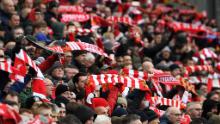English Premier League returns after 100-day hiatus

On Wednesday, Aston Villa hosts Sheffield United, while Manchester City faces Arsenal. All of the league’s remaining 92 fixtures will be held behind closed doors.
The restart comes at a point when some regions, such as the northwest of England, have been identified as potential hotspots for the virus with infection rates decreasing more slowly.
There have also been concerns whether fans might congregate outside of stadiums, notably in the city of Liverpool where Jurgen Klopp’s side could clinch its first league title in 30 years with victory over local rival Everton on Sunday if Arsenal beats Manchester City.
There had been talk of staging the match at a neutral venue but the teams have since been permitted to play the game at Everton’s Goodison Park.
Liverpool’s mayor Joe Anderson had initially opposed the idea but has recently stated his support of games being held in the city.
The two rivals have united in encouraging fans to stay at home but lifelong Liverpool supporter and season-ticket holder John Cooper says authorities need not worry.
“People underestimate football supporters in general,” Cooper told CNN Sport. “Overall I think people have the impression that supporters are thick but I think you’ll see a lot of common sense when the games do start.”
Too soon?
Cooper is part of a group of fans who have traveled home and away to watch Liverpool play for decades.
They’ve all missed their regular fix of football and say seeing their side lift the Premier League trophy will be a welcome boost to morale.
However, they don’t all agree on whether now is the right time to return and say lessons should be learned from Liverpool’s Champions League match against Atletico Madrid which was controversially played on March 9.
“I think it’s too soon for them to bring football back. They were too late bringing in the lockdown,” said lifelong Reds fan Terry Maher.
“The Atletico [Madrid] game was the big one. They should never have played the game. We were mixing with the Spanish fans all night into the early hours of the morning, singing and dancing with them.
“It should never have gone ahead and I don’t think we should be playing next week.”
Morale boost
One thing many fans agree upon is that the return of football will be good psychologically.
A survey conducted by Level Playing Field found 43% of participants said the suspension of live sport had had a significant impact on their mental health.
In addition, 62% of supporters feared it would have a huge impact on their own personal well-being if they were unable to return matches next season.
It’s an opinion echoed by Alastair Campbell, who was a former spokesman for Tony Blair when he was UK Prime Minister. Campbell has been a vocal critic of the way the current British government has handled the pandemic.
He points toward the successful return of the German Bundesliga as a reason to be hopeful.
“I think Germany has shown it can be done and talking to people I know in football it seems that the football world is very well catered for in terms of testing and protocols,” Campbell, who is a Burnley fan, told CNN Sport.
“I think the risk to the general public is negligible and the need to get football back is strong.”
Financial implications
The return of football is not purely in aid of national morale, there is an undeniable financial aspect.
“Football returning — in a safe and sensible way — is clearly important to limiting the financial impact that the pandemic has had,” said Dan Jones, head of the Sports Business Group at Deloitte.
“Much remains uncertain, particularly around the timing and scale of the return of fans to stadiums and the impact on commercial and broadcast partners’ wider businesses.”
Safety guidelines
Much like the Bundesliga, Premier League teams will have to adhere to strict guidelines that outline who is able to enter the stadium on game day.
The stadiums will be split into red, amber and green zones with only 300 people permitted to enter and all encouraged to obey social distancing rules.
Only 110 people will be permitted pitchside with everyone having to have returned a negative coronavirus test within the previous five days.
Match balls, corner flags and goalposts will be deep cleaned during the game but substitutes and coaching staff will not be required to wear protective masks in the reconfigured technical areas.
Teams will also arrive separately at the stadium and enter onto the pitch at staggered times in order to minimize the risk of infection.
Players have been asked not to spit or clean their noses on the pitch and urged not to surround match officials during the game.
Due to the congested fixture list from now until the end of the season, games will be stopped for a drinks break midway through each half with each team allowed a maximum of five substitutes — up from the usual three.
Clubs have also been encouraged to not stay in local hotels the night before the game and have instead been asked to fly to matches where possible.
A Norwich City player was one of two people to test positive for Covid-19 after the latest round of tests.
Black Lives Matter
Names on the back of players’ jerseys will be replaced with ‘Black Lives Matter’ for the first 12 matches of the season as the Premier League responds to the anti-racism protests that have spread around the world, sparked by the death of George Floyd.
Players will also be supported if they decide to take a knee before or during the games and a Black Lives Matter badge will be visible on every shirt for the remainder of the season.








